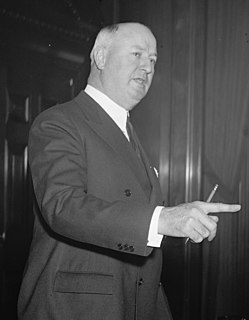Цитата Александра Гамильтона
Возникновение всякого справедливо установленного гражданского правления должно быть добровольным договором между правителями и управляемыми; и должны подлежать таким ограничениям, которые необходимы для обеспечения абсолютных прав последнего; ибо какой первоначальный титул может иметь какой-либо человек или группа людей, чтобы управлять другими, кроме как с их собственного согласия?
Темы цитат
Абсолютный
Любой
Между
Гражданским
договором
Согласие
Установлено
За исключением
правительства
Правительство
Справедливо
Последнее
Ответственность
Ограничения
Человек
Мужчины
Должны
Необходимое
происхождение
Оригинал
Другие
Собственные
права
Управляемые
Правители
Безопасность
Установленный
титул
Добровольный
Связанные цитаты
Каждому американцу необходимо с положенной энергией попытаться остановить распространение принципов, явно разрушительных для дела, за которое они пролили кровь. Это должно быть совместной добродетелью правителей и народа, чтобы сделать это и спасти и сохранить их гражданские и религиозные права от протянутой руки тирании, которая может проявиться при любом режиме или форме правления.
Позиция Мейкледжона состоит в том, что свобода слова в условиях демократии не является абсолютным, вытекающим из безграничного источника некоего предполагаемого «естественного права». Это практическая необходимость «самоуправления на основе всеобщего избирательного права», поскольку, если гражданам не разрешено обсуждать вопросы управления, как они могут быть теми, кем они должны быть в демократии, — правителями и управляемыми?
Если бы люди были ангелами, не было бы необходимости в правительстве. Если бы ангелы управляли людьми, то не было бы необходимости ни во внешнем, ни во внутреннем контроле над правительством. При создании правительства, которым должны управлять люди над людьми, великая трудность заключается в следующем: вы должны сначала дать правительству возможность контролировать управляемых; и, во-вторых, обязывать его контролировать себя. Зависимость от народа есть, без сомнения, первичный контроль над правительством; но опыт научил человечество необходимости дополнительных мер предосторожности.
Есть люди, которым не хватает уверенности в честности и способности людей управлять собой. Всем, кто питает подобные страхи, я с величайшим почтением скажу, что я их не питаю. Если человек неспособен и ему нельзя доверять управление собой, то следует ли ему доверять управление другими? Кто же тогда будет управлять? Ответ должен быть «Человек», потому что у нас пока нет ангелов в человеческом обличии, готовых взять на себя ответственность за наши политические дела.
Преобладающее учение этого века состоит в том, что нет пределов способности человека управлять другими и что, следовательно, никакие ограничения не должны налагаться на правительство. Старая вера, порожденная долгими веками страданий под господством человека над людьми, заключалась в том, что осуществление неограниченной власти людьми с ограниченным умом и эгоистичными предрассудками вскоре становится угнетающим, реакционным и развращающим. Старая вера учила, что само условие прогресса заключается в ограничении власти способностями и добродетелью правителей.
Даже правительство с согласия управляемых, как в нашей собственной конституции, должно быть ограничено в своей власти действовать против своего народа; чтобы не было вмешательства в право на отправление культа или в безопасность дома; никакого произвольного наложения штрафов или штрафов со стороны высокопоставленных или низших должностных лиц; никаких ограничений на свободу людей искать образование, работу или возможности любого рода, чтобы каждый человек мог стать всем, на что он способен стать.
Наши конституции претендуют на то, чтобы быть установленными «народом», и, теоретически, «все люди» соглашаются на такое правительство, которое разрешено конституциями. Но это согласие «народа» существует только в теории. На самом деле его не существует. Правительство в действительности устанавливается немногими; и эти немногие принимают на себя согласие всех остальных, хотя в действительности такое согласие не дается.
Мы не позволим, чтобы наши собственные деньги были вынуты из наших карманов без нашего согласия; потому что, если какой-либо человек или какая-либо группа людей возьмет у нас без нашего согласия или согласия наших представителей один шиллинг в фунте, у нас нет гарантии на остальные девятнадцать. Мы обязаны нашей родине подданными, но не будем платить ей за покорность рабов.
В свободном правительстве гарантии гражданских прав должны быть такими же, как и гарантии религиозных прав. Оно состоит в одном случае во множественности интересов, а в другом — во множественности сект. Степень безопасности в обоих случаях будет зависеть от количества интересов и сект; и можно предположить, что это зависит от размеров страны и числа людей, находящихся под властью одного и того же правительства.





























